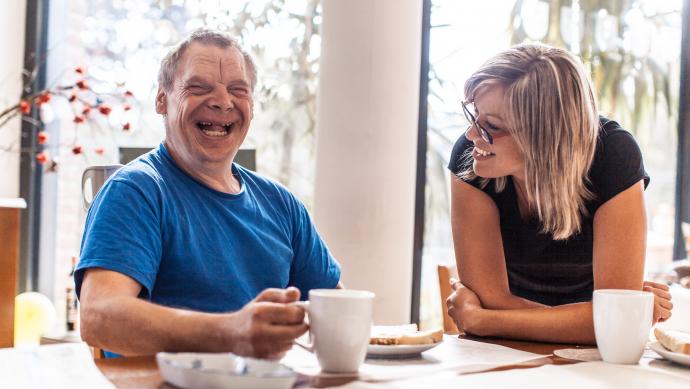The 13th European Congress of Mental Health in Intellectual Disability (EAMHID) was held in Berlin, Germany, September 23- 25, 2021. The central theme was 'From Science to Practice'. To kick off sharing the knowledge we have interviewed some of the keynote speakers. This is an interview with Tina Cook, Professor of Education, Faculty of Liberal Arts, Education and Social Science, Liverpool Hope University.
Research, intellectual disabilities, and mental health (or challenging behaviour). What comes to mind reading these key words?
What comes to mind for me when seeing these key words is firstly, ‘what’s in a word? These words all hold the potential for ‘illusory consensus’ i.e. we can each attach meaning to the word or phrase and believe that others attach the same meaning. In the belief that we all understand each other, we go on to act in different ways. Naming is merely a convention; it does not define the properties of the word and building on non-contested words can confuse rather than clarify.
Secondly, all these words have meanings that can be limiting if that meaning is not unravelled, and indeed not contested. For instance, long held perceptions of what it means to do research, and how to judge the quality of research, can limit more diverse forms of enquiry that use different approaches to finding out. This is especially so if those approaches appear to challenge traditional quality frameworks. One example might be that in experimental research it is generally considered important to remain distant from those who are part of the experiment, but in participatory research it is considered important to build a relationship with those whose lives and/or work are central to the topic being researched.
The word ‘disability’, as in intellectual disability, is contested. Many of the people I work with consider it portrays them as fixed, unable to engage in complex thinking, or to learn how to. They prefer to use the word ‘difficulties’ because, as they say, difficulties can be overcome. The unravelling of this word offers an indication of how it has been understood. It is important that ‘The words and phrases above’ are unravelled for use rather than used as a shorthand that has not been well understood. Without such exploration the phrase ‘challenging behaviour’ for instance, can lend itself to a normative framework that places the ‘problem’ with the person whose behaviour is disruptive to the ways of others. It can lead unilaterally to an expectation that it is the person who displayed the behaviour that needs to change rather taking a holistic approach where all need to consider ways of change.
What is the main research objective/theme/focus of the study you will be presenting?
The topic of the presentation reflects on a research project, carried out in the UK, with family carers of adults with learning disability and behaviours that challenge. The project, Family Based Positive Support (FaBPoS), sought to better understand what might enable family carers to maintain resilience in the face of ongoing challenges encountered in long-term caring roles. The substantive topic for the research was the use of Mindfulness and Acceptance and Commitment Therapy. The element I will talk about is, however, how research (processes and practices) in the form of participatory health research, can come together to understand the basis for building effective working relationships between professionals/practitioners and families: how this creates a space for family carers to build resilience in their own way.
The main theme of this presentation is the power of agency in research and the effect of agency on the impact of research. It offers insights into how the co-labouring processes inherent in participatory health research can:
- develop powerful trajectories to complex understanding and meaning making
- act as change mechanisms creating the conditions for direct and meaningful impact
- create change, not merely at the end of the project but embedded throughout, that goes beyond delivering expected outcomes.
What are the main results from your study?
The study had two main results, the first on the lives of family carers. It demonstrated how Mindfulness and ACT had the potential to positively affect the resilience of family carers in the face of behaviour that challenged their lives. This had an additional ripple, and reciprocal, effect on the lives of their family members, both people with and without learning difficulties. When family carers changed their behaviours so did their family members.
Can you give some examples of topics or outcomes which have (positively or negatively) surprised you?
The second result, the ripple effect, was not an espoused aim of the study, and in that sense, it was a surprise to see changes in long-standing behaviours that created challenges for families. Another surprise was how the conversations initiated by family carers had a major impact on how facilitators understood their practice. Key to enabling family carers to change their own behaviours was that the people facilitating the course (the psychologists) changed theirs.
How might outcomes of your (previous) studies affect daily practice in the support of persons with intellectual disabilities and mental health disorders and/or challenging behaviour?
This study did not focus on the person with learning difficulties/disability, but on the resilience of family carers. To do this it brought psychologists and family carers together to engage in critical enquiry through participatory research. Within that research milieu those who took part in co-labouring together established their own ways for changing their behaviours rather than being asked to apply a prescribed change. This self-created change in behaviour had ripple effects. The change in family carer behaviour was seen, in many cases, to have a positive effect on the person they cared for, in some cases leading to reductions in long-standing, dangerous behaviours that had limited family life for all.
Change in facilitator (psychologist) behaviour was seen to create spaces for family carers to determine their own changes that were effective in their family spaces. Insight into how facilitator behavioural change occurred and how this effected the ability of family carers to change their own behaviours has been taken into wider practice. It has been rolled out through daily practice of the psychologists involved in the study in a large Mental Health NHS Foundation Trust and a community-based programme of Positive Behaviour Support in the North East of England.
How can daily care providers improve their support based on your study/work?
Important results professionals should know about to help develop their practice when working with families with long term caring responsibilities include:
- professionals/practitioners need to consider the impact of ‘give’ in ‘give and take’ and reducing the giving and increase the taking
- become invisible facilitators
- recognise the depth of their own knowledge, their own professionalism, but wear it lightly.
Can you suggest topics for future studies you will be working on?
I will be making methodological contributions to a study intending to use participatory approaches to understand, make meaning of, and develop, the use of Formulation with mental health services across a large NHS Mental Health Foundation Trust in the North East of England.
With whom would you like to do a study in the future? And why?
I seek to work alongside, and with, the seldom heard, particularly those whose voices have not only been ignored, but have been dismissed as, at best, subjective. I am always humbled, amazed, and surprised by the capacity for critical thinking and the depth of knowledge that emerges from working together, and the joy that occurs from truly co-labouring and revealing new ways of thinking and acting. Co-labouring is a powerful catalyst for change that can be lost if we perpetuate systems of hierarchical knowledge that do not connect to the daily realities of those whose lives and work are at the heart of the research.
How can we better implement scientific findings in daily practices?
Enabling enquiry as a shared process, where agency is not merely systems led but afforded to those whose lived experience will contribute to the development and application of new knowledge. It is a powerful means for implementing what is being learned through research.



